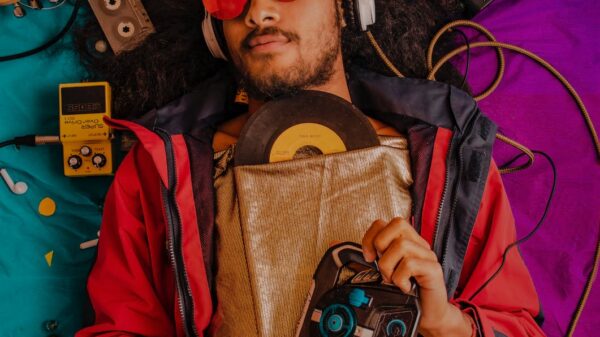Music has been a part of human life since the beginning of time. It has the power to make us dance, sing, cry, and feel emotions we never knew existed. It connects us with our inner selves and helps us express our feelings in ways that words cannot. Music is more than just entertainment; it’s a form of therapy, an outlet for creativity, and a way to communicate across cultures and generations. In this blog post, we will explore the power of music: why it moves us and shapes our lives in profound ways that go beyond what meets the ear. Get ready to be inspired!
Introduction to Music and Its Benefits
Music has been a part of human culture since the early days of our species. It is one of the oldest and most universal forms of art. Music can be used for entertainment, relaxation, or to express powerful emotions. It can be enjoyed alone or shared with others.
There are many benefits to listening to music. Music can help reduce stress, anxiety, and pain. It can also improve sleep quality, boost mood, and increase cognitive performance. Listening to music can also be a great way to bond with friends and family members.
Whether you enjoy classical symphonies or modern pop hits, there is a type of music out there that you will enjoy. So why not give it a try?
How Music Impacts Our Emotions and Memories
In his book This is Your Brain on Music, neuroscientist Daniel J. Levitin discusses how music has a profound impact on our emotions and memories. He cites research showing that music can trigger the release of dopamine, a neurotransmitter associated with pleasure and reward. Dopamine is also involved in the formation of long-term memories, which helps explain why we often associate certain songs with specific memories or experiences.
Music can also have a powerful effect on our moods. Studies have shown that listening to happy or uplifting music can improve our overall mood and increase feelings of happiness and well-being. Conversely, listening to sad or depressing music can cause us to feel down or even experience clinical depression.
So what does all this mean for you? If you want to boost your mood or memory, try listening to some of your favorite tunes. And if you’re feeling blue, don’t be afraid to crank up the volume on those sad songs – they just might help you get through whatever it is you’re going through.
The Different Types of Music and Their Effects
There are many different types of music, and each one can have a different effect on our mood and emotions. Here are some examples:
-Classical music has been shown to improve focus and concentration, as well as reduce stress and anxiety.
-Upbeat pop songs can provide a boost of energy and make us feel happier.
-Slow, relaxing melodies can help us wind down and fall asleep.
-Songs with lyrics that we can relate to can provide comfort or encouragement during tough times.
Music is truly powerful, and its effects can vary depending on what we’re listening to. So next time you need a pick-me-up or want to relax, be sure to choose the right type of music for the mood you’re trying to achieve!
How We Use Music to Express Ourselves
Most of us can think of a time when we’ve felt moved by music. Maybe it was a song that brought back memories of a past relationship, or a piece of instrumental music that took us to another place entirely. Music has a way of touching us emotionally and connecting with us in a way that other forms of communication don’t.
So why does music have this power over us? Part of it has to do with the fact that music is processed in multiple areas of the brain. When we hear a piece of music, our brains are not only processing the sound waves but also the lyrics (if there are any), the melody, and the rhythm. This means that music can affect us on multiple levels, both intellectually and emotionally.
Another reason music is so powerful is because it’s often used as a form of self-expression. When we listen to music, we can identify with the emotions being expressed in the song. This can be especially helpful when we’re going through tough times and need an outlet for our feelings. Music can help us express ourselves in ways that we might not be able to do with words alone.
So next time you’re feeling down or just need something to boost your mood, try putting on your favorite tunes and letting yourself feel the power of music.
The Power of Music in Different Cultures
Different cultures have their own unique ways of using music to express themselves and connect with others. For example, in many Native American cultures, music is used for healing ceremonies and spiritual rituals. In African cultures, music is often used as a way to communicate with ancestors and spirits. And in the Middle East, music is often used to express joy or sorrow, or to tell stories.
Each culture has its own way of understanding the power of music, and each uses it in different ways. But there are some common themes that run through all of these different cultures. Music can be a powerful tool for connecting with others, for communicating emotion, and for sparking creativity. It can also be a force for healing and transformation.
No matter what culture you come from, music can be a powerful force in your life. Whether you’re using it to connect with others, express yourself, or simply enjoy the moment,music can enhance your life in countless ways.
Exploring the Science Behind Why Music Moves Us
Why does music have the power to move us? Is it the lyrics, the melody, or the beat? Or is it something more complicated than that?
Scientists have been trying to answer this question for years, and they’ve found that there’s a lot more to it than just the notes. In fact, music affects our brains in ways that we’re only just beginning to understand.
Here’s a look at some of the science behind why music moves us:
1. Music activates the reward system in our brains.
When we hear music that we enjoy, our brains release dopamine, a neurotransmitter that helps regulate pleasure and motivation. This is why listening to music can feel so rewarding.
2. Music can help us better connect with other people.
Studies have shown that listening to music together can increase bonding and cooperation between people. This is likely because when we share music with others, we synchronize our brainwaves and heartbeats, which makes us feel more connected to them.
Creative Uses of Music in Everyday Life
In addition to the obvious ways music can improve our moods and mental states, there are many other creative uses for music in our everyday lives. Here are a few examples:
1. Make a personalized soundtrack for your life. Have different songs for different activities, or create a playlist that tells a story. This is a great way to get motivated and pump yourself up for whatever you’re about to do.
2. Use music to help you focus and increase productivity. If you have trouble concentrating, try listening to classical or instrumental music while you work. Some people find it helpful to sing along as well – anything to get those creative juices flowing!
3. Connect with others through music. Whether it’s going to concerts, sharing your favorite songs with friends, or simply dancing around your living room, music can be a great way to bond with the people you care about.
4. Let music inspire you. Use it as a tool for creative visualization, daydreaming, and manifesting your dreams into reality. There are no limits to what you can do with this one!
5. Get in touch with your emotions. Music can be therapeutic, whether you’re feeling happy, sad, angry, or anything in between. It’s perfectly okay (and encouraged) to let yourself feel all the feels – especially when there’s such an amazing range of tunes out there to suit every mood imaginable.”
Conclusion
Music has a powerful ability to move us and shape our lives in extraordinary ways. We can use music as a tool to bridge gaps, express emotion, celebrate accomplishments, heal wounds, and create unforgettable memories. Even if we don’t understand the words of a song or can’t appreciate every melody, we all have something to gain from allowing ourselves to explore this incredible medium that is so deeply ingrained into our humanity. So go ahead – turn up the volume and let the power of music take you away!










